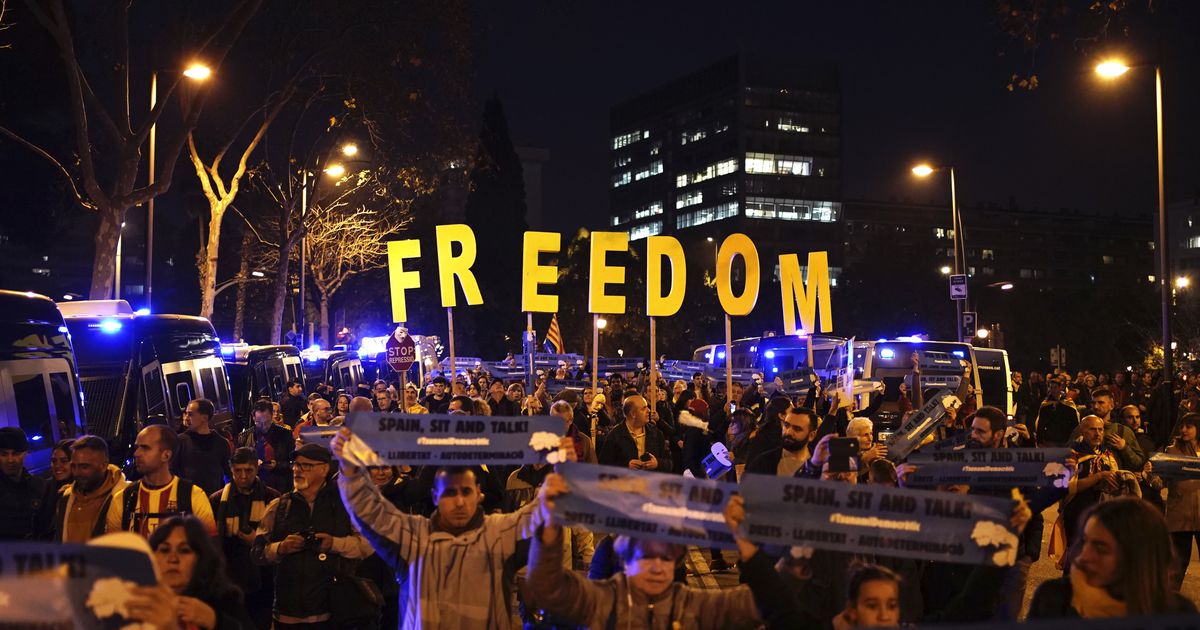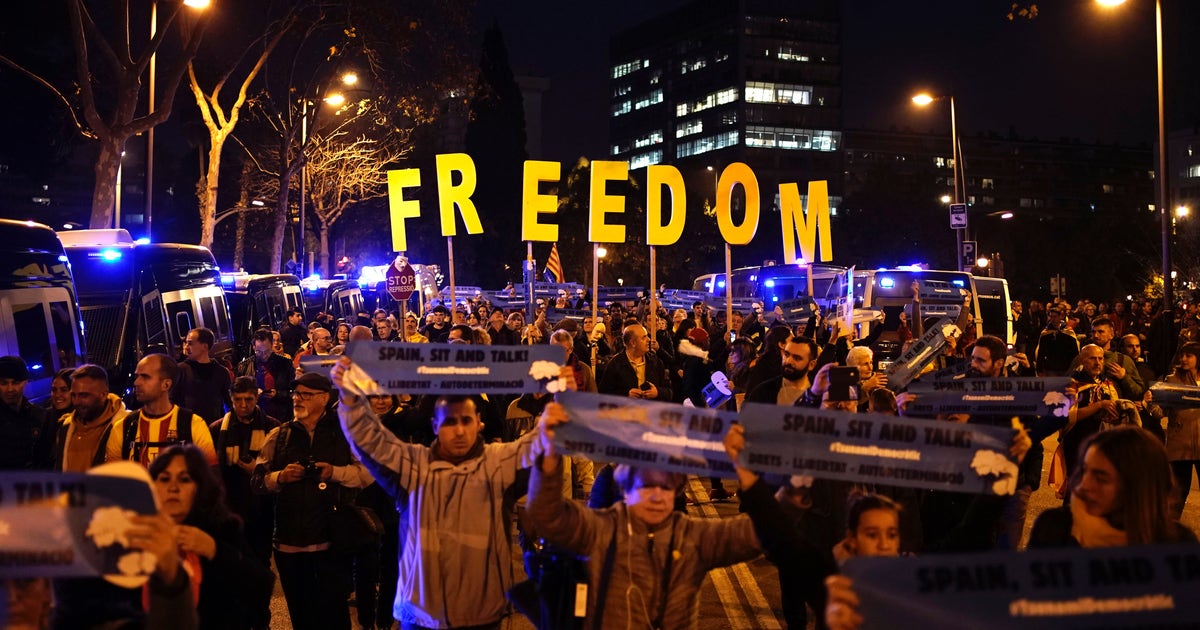Police gird for separatist protest at Barcelona soccer match


BARCELONA, Spain (AP) — Thousands of police and private security personnel deployed Wednesday in and around Barcelona’s Camp Nou stadium to ensure that a demonstration by Catalonia’s separatist movement did not disrupt one of the world’s most-watched soccer matches.
Spanish league leader Barcelona was hosting its fierce rival, No. 2 Real Madrid, and the separatists aimed to take advantage of the global media coverage to promote their bid for independence from Spain.
The game, known as El Clásico, was postponed from Oct. 26 because of fears that the separatists — then in the midst of a week of violent protests — would try to disrupt it.
Barcelona is the regional capital of the wealthy northeast region of Catalonia. Spain opposes any breakup of the country, saying it would violate its constitution.
Protest organizers said that over 25,000 people signed up to gather near the Camp Nou stadium and would try to get inside. Nearly 100,000 fans are expected for the match in what is Europe’s biggest stadium, and more than 3,000 police and security guards were on hand.
A shadowy online group called Tsunami Democratic, which was behind the protest, posted a message on social media saying: “Hello, world! Tonight Tsunami has a message for you.”
Hours before the kickoff at 1900 GMT (2 p.m. EST), police set up metal barriers around the stadium. Both team buses entered Camp Nou without incident.
There was a festive atmosphere before the game and protesters were hard to distinguish from soccer fans. Some of them briefly blocked main roads to the stadium.
Small groups chanted pro-independence slogans and many wore red-yellow-and-blue pro-secession flags. Others carried flags urging the release from prison of nine of the movement’s leaders convicted in October for their role in a failed 2017 secession bid.
Pro-independence supporters blended with fans from other parts of Catalonia and the rest of Spain, as well as those who came from abroad to see the marquee match.
Organizers did not say what form the protest would take, and police said they couldn’t rule out an attempt by demonstrators to interrupt the match. The Barcelona team asked its fans to behave with civility and not to affect the match.
Francisco Sánchez, a 60-year-old mechanic, was outside Camp Nou hours before the match. He did not have a ticket, but was one of several protesters who distributed small blue banners with the message “SPAIN, SIT AND TALK” — a reference to the Spanish government’s refusal to discuss Catalan independence.
“I hope this movement will make our leaders realize that they have to lay off the law and start taking,” he said. “This can’t be solved with violence, but through words.”
Miguel Ángel Giménez, a 42-year-old policeman in a Barcelona shirt and scarf, drove with a friend over 700 kilometers (430 miles) from the southern region of Murcia to attend the match.
“Our friends back home told us we were crazy to cross half of Spain to go to a game that might not be played,” he said, adding that “everything is quite calm. There is lots of security.”
The U.S. Consulate in Barcelona advised people to avoid the area or exercise caution if they are nearby.
“These demonstrations present the potential for violence between radical groups for and against the Catalan independence movement,” the alert read. “Demonstrations this autumn led to clashes between law enforcement, protesters, and counterprotesters.”
Henrik Noerrelund, a 55-year-old electrician from Denmark, flew in with his wife to attend his first Barcelona match after a lifetime supporting the club.
“In my parts, they used to say politics and football don´t mix, but today you have to accept it,” Noerrelund said. “It’s there, you cannot separate it, you have seen it for many years, and I don’t think they can manage to separate it and just play football.”
Separatist sentiment grew sharply in Catalonia during the global recession that hit Spain hard. The 7.5 million residents of Catalonia are about equally divided by the secession question, according to polls and election results.
Separatists have used the Camp Nou stadium as a protest platform for years. They shout “Independence!” at a set time during matches and sometimes unfurl banners.
The Barcelona team has walked a fine line between supporting its fans’ right to free expression and aligning itself with the greater interests of Catalonia. Many feel it does not fully support secession so as not to anger its Catalan fans who are not separatists or its millions of supporters across Spain.
With its slogan “More than a club,” it presents itself as a Catalan institution, aligned with the region’s proud cultural traditions and language, which is spoken along with Spanish in the semi-autonomous region.
Its rivalry with Real Madrid has a decades-old political undercurrent, with many Catalans — just like residents of other regions in Spain — seeing the capital’s team as a symbol of domineering, central power and a hallmark of Spanish unity and authority.
Madrid supporters, in turn, see Barcelona as representing a traitorous region that wants to break up Spain. For many years, some Barcelona fans held up a massive banner at games that read “Catalonia is not Spain.”
Players from both teams usually get along very well. The Spanish national team that won the 2010 World Cup and two European Championships was packed with players from both sides.
Security is always high whenever they play — just like at many soccer matches between fierce rivals — but there is no history of violence at the games.
Tsunami Democratic carried out its first major action in October when it organized a large protest after several of the secession movement’s leaders were sentenced to jail for their role in a failed secession bid in 2017.
A call by Tsunami Democratic led to thousands of angry protesters gathering at Barcelona’s airpor t. A massive street fight broke out between the most radical protesters and police inside and outside the terminal, and about 150 flights were canceled as ground transport was halted for hours. Protests by separatists left more than 500 people injured, half of them police.
——
Associated Press writers Ciaran Giles in Madrid and Barry Hatton in Lisbon, Portugal, contributed.





